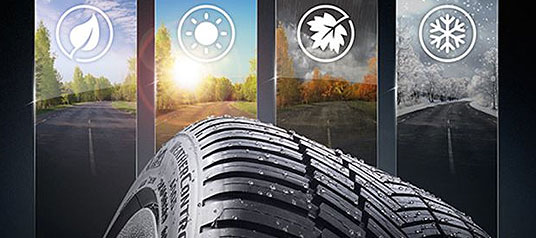All Season Tyres: Everything You Need To Keep In Mind
All-season tyres are all-rounder’s designed to provide exemplary performance in the broadest possible range of driving situations. They have a more flexible body than winter tyres, meaning they don’t work as well on snow or ice but offer improved comfort (a slightly wider summer tyre version is also available for SUVs and pick-ups).
- All-seasons will perform adequately in all weathers; therefore, they are safe enough to be used year-round.
However, because this type of Hankook Tyres Ashford is not targeted at drivers who frequently use their vehicle during colder months, it won’t compare with that expensive set of winter tyres you bought last year. A low rolling resistance helps improve the economy and reduce emissions.
TIP: For advice on winter tyres, which are built to give a better grip than any other type of tyre?
What Can All-Season Tyres Do?
All-season tyres are specifically designed to provide exemplary performance in the broadest possible range of driving situations.
- They’re designed to resist hydroplaning (when a layer of water builds up between the road and your tyre, causing it to skid) and provide responsive handling in wet conditions.
- The rubber used by manufacturers is formulated to maintain its tread pattern for longer and stay flexible at lower temperatures, meaning you’ll benefit from safe braking distances whatever the weather.
All-seasons grip well on dry roads (although they are not as good as summer tyres explicitly designed to grip on warm surfaces), but their most significant advantage is that they work well in the snow. The rubber compound used is one of the main differences between all-season tyres and winter tyres (or ‘Y’ tyres), designed to provide more grip at lower temperatures.
As well as having more silica (to maintain flexibility at low temperatures), winter tyre rubber is slightly softer than summer tyres (which gives better traction).
What Do All-Season Tyres Cost?
All-seasons generally cost less than summer tyres and very little compared with winter options. A complete set of four will typically set you back £40 – £80. A new car’s first set of all-season Car Tyres Ashford costs around £25 – £35 for a pair.
Who Makes All-Season Tyres?
All-season tyres are made by most major automotive tyre manufacturers, including Pirelli, Continental, Bridgestone and Michelin. Because this type of tyre is not targeted at drivers who make frequent use of their vehicle during colder months, it won’t compare with that expensive set of winter tyres you bought last year.
However, if your car comes with all seasons included, it will probably be branded as ‘Original Equipment.
Most cars now come standard with all-season tyres (although these may change to summer ones when the warm weather comes), but you can usually opt for them at the point of purchase for an additional fee.
What Do The Experts Say About All-Season Tyres?
All-seasons are generally best suited to smaller vehicles that don’t drive through the winter months, and they’re not designed for active drivers who make frequent use of their vehicle during colder months
- However, we think these drawbacks are outweighed by their low cost and ease of fitting.
The main downside is they won’t compare with a set of winter car tyres Ashford (or ‘Y’ tyres), which provide more grip when it’s cold, but because winter tyre technology moves at such a pace, you may find yourself needing to invest in new sets every year.
All-season tyres come into their own most during spring and autumn, when roads may be wet, sloppy or covered in leaves. They’re also a good choice for people who don’t have the space to store winter tyres – or if you live in an area with only one set of road conditions throughout the year. A new car’s first set of all-season tyres costs around £25 – £35 for a pair.
What Do Customers Say About All-Season Tyres?
Most of our customer reviews are very positive, and they praise tires’ long life and grippe nature on dry and wet roads. However, some people claim that they make their cars more challenging to drive in the summer months when there’s no natural tread pattern biting into warm tarmac (although this is more likely caused by overinflated tyres, which can affect performance).
What Are The Best All-Season Tyres?
While we’re unable to recommend one specific brand or model of all seasons above any other (because price and availability vary too widely), two things could help you choose.
These will give you an accurate picture of each tire’s strengths and weaknesses so that you can choose the right ones based on your priorities. The second is to remember that prices do vary wildly between sizes. So if you don’t need one particular size, consider choosing a cheaper alternative, which will make your all-seasons more cost-effective.




